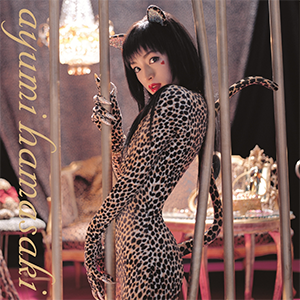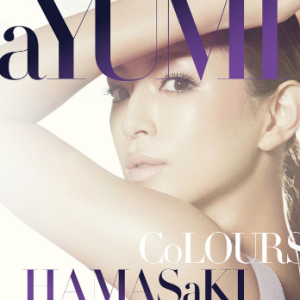
Ayumi Hamasaki is a Japanese singer, songwriter, record producer, actress, model, spokesperson, and entrepreneur. By 2002, Hamasaki had earned the nickname "Empress of J-pop" due to her popularity in Japan and throughout Asia, as well as being referred to as "the voice of the lost generation". Due to her success and relevance throughout her career, she is considered one of the top solo female artists of the Heisei era for her influence on the music industry and various fashion trends.

Loveppears is the second studio album by Japanese recording artist Ayumi Hamasaki. It was released in Japan, Hong Kong and China on November 10, 1999, through Avex Trax and the China Record Corporation, and distributed worldwide on April 10, 2001, by Avex Entertainment Inc. It was entirely written by Hamasaki herself, while the production was handled by Japanese musician Max Matsuura. Musically, Loveppears is a dance album and lyrically focuses on themes of love, frustration of life, loneliness, and individualism.

Duty is the third studio album by Japanese recording artist Ayumi Hamasaki. It was released on September 27, 2000, by Avex Trax. Duty is Hamasaki's first studio album inside the 2000 decade, and her third consecutive studio album to be fully produced by Japanese musician and businessman Max Matsuura. The album's composing and arrangement was handled by several music collaborators, such as Ken Harada, Kazuhito Kikuchi, Dai Nagao, HΛL, among many others. Hamasaki contributed to the album as the primary and background vocalist, and songwriter to every song. Three different formats were released to promote the album: a standalone CD, a limited edition Playbutton, and a digital download. The cover sleeve has Hamasaki wearing a leopard-print cat suit.

"Surreal" is a song by Japanese recording artist Ayumi Hamasaki, taken from her third studio album Duty (2000). It was written by Hamasaki and produced by Max Matsuura. The song is a rock with elements of alternative rock. "Surreal" describes Hamasaki's madness and sense of confusion, while the themes of "Surreal" are based on Hamasaki's concept of loneliness, chaos, confusion, and the burden of her responsibilities, aimed mostly toward her public image as a recording artist. It was released as the fourth single from the album on 27 September 2000 by Avex Trax and Avex Taiwan.

"Whatever" is a song recorded by Japanese recording artist Ayumi Hamasaki for her second studio album, Loveppears (1999). It was written by Hamasaki, while production was handled by Max Matsuura. The track is Hamasaki's sixth single with Matsuura since her debut single in April 1998, "Poker Face". "Whatever" premiered on February 10, 1999 as the lead single from the album. It was re-released on February 28, 2001 as a CD single.

"Love (Destiny)" (stylized as "LOVE ~Destiny~") is a song recorded by Japanese recording artist Ayumi Hamasaki, serving as the second single for her second studio album, Loveppears (1999). It was released by Avex Trax in Japan and Taiwan on April 14, 1999, and through Avex Entertainment Inc. worldwide in September 2008. The track was written by Hamasaki herself, while production was handled by long-time collaborator Max Matsuura. Three versions of the recording have been made available—a ballad version arranged by Tsunku, an edited version with vocals by Tsunku, and a dance-influenced version included on Loveppears.

"To Be" is a song by Japanese recording artist Ayumi Hamasaki. It served as the third single from Hamasaki's second studio album Loveppears (1999). The track was released by Avex Trax in Japan and Taiwan on May 12, 1999, and through Avex Entertainment Inc. worldwide in September 2008. It was Hamasaki's final single to be distributed as a Mini-CD, a format that debuted at the start of her career in April 1998. "To Be" was written by Hamasaki herself, while production was handled by long-time collaborator Max Matsuura. Musically, it is a J-Pop that was written in third person perspective, much like the content from the parent album.

"Vogue" is a song recorded by Japanese recording artist Ayumi Hamasaki for her third studio album, Duty (2000). It was written by Hamasaki, while production was handled by Max Matsuura. It premiered on April 26, 2000 as the lead single from the album. Her third consecutive lead single to be produced by Matsuura, the song is part of a trilogy from Duty; the other two singles being "Far Away" and "Seasons".

"Seasons" is a song recorded by Japanese recording artist Ayumi Hamasaki for her third studio album, Duty (2000). It was written by Hamasaki, while production was handled by Max Matsuura. It premiered on June 7, 2000 as the third single from the album. The song is the final part of a trilogy from Duty; the other two singles being "Vogue" and "Far Away".

"Daybreak" is a song recorded by Japanese recording artist and lyricist Ayumi Hamasaki, released on March 6, 2002 as the eighth and final single on her fourth studio album I am.... Influenced by the recent events off the September 11 attacks in New York City and Washington D.C. in North America, Hamasaki sought a new inspiration for her then-forthcoming album; instead off writing songs about confusion, loneliness and love like her previous efforts, she was encouraged to engage in more peaceful and worldly themes. This resulted in several songs on I Am..., including "Daybreak".

Guilty is the ninth studio album by Japanese recording artist Ayumi Hamasaki. It was released on January 1, 2008 by Avex Trax. Guilty marks Hamasaki's ninth consecutive album to be fully produced by Japanese producer and manager Max Matsuura, while she contributes to the album as the lead vocalist, background vocalist, and songwriter to all songs. Recorded in Japanese with minor phrases in English, Guilty is a rock album with numerous musical elements such as pop rock, heavy metal, synthrock, and power ballad melodies.

"Rule"/"Sparkle" is a double A-side single by Japanese recording artist Ayumi Hamasaki from her tenth studio album, NEXT LEVEL' (2009). The song was released on a CD and DVD format on February 25, 2009 as the second single from the album. With "Rule" composed by Miki Wantanabe and "Sparkle" composed by Kazuhiro Hara, both songs were written by Hamasaki and produced by long-time collaborator Max Matsuura. "Rule" was used as the international theme song for the 2009 film Dragonball Evolution.

"You Were..." is a song recorded by Japanese recording artist Ayumi Hamasaki, taken from her tenth studio album, Rock 'n' Roll Circus (2010). It was written by Hamasaki with production being done by long-time collaborator Max Matsuura. The song premiered on December 29, 2009 as the album's second a-side single with the album track, "Ballad". Four formats were released for the single; a CD format, a CD and DVD bundle, a limited edition box set, and a digital download. The first three artworks feature Hamasaki laying in snow, whilst the limited edition box set has a long-shot of Hamasaki in a dress.

Rock 'n' Roll Circus is the eleventh studio album by Japanese recording artist Ayumi Hamasaki. It was released on April 14, 2010, by Avex Trax. It was also released just a little over a year after her 2009 album, Next Level. Rock 'n' Roll Circus marks Hamasaki's eleventh consecutive album to be fully produced by Japanese producer and manager Max Matsuura, while she contributes to the album as the lead vocalist, background vocalist, and songwriter to all songs. Recorded in Japanese with minor phrases in English, Rock 'n' Roll Circus is a rock album with numerous musical elements such as electropop, J-pop, rock, pop ballad, and dance music.

Five is the second mini-album by Japanese singer Ayumi Hamasaki. It was released on 31 August 2011, in three editions: CD+DVD, CD-Only and a limited CD-Only edition. A Blu-ray version of the mini-album was released on 9 November 2011, making Five the world's first album to be released in Blu-Ray. Hamasaki was the only lyricist on Five, and the songs were composed by multiple composers. The EP gets it title from its track listing, which consists of five tracks.

Again is the fourth extended play by Japanese recording artist Ayumi Hamasaki from her fourteenth studio album Love Again (2013). The EP contains the songs "Wake Me Up", "Sweet Scar", "Snowy Kiss" and "Ivy", alongside remixes and instrumental versions of the original tracks. Produced by longtime collaborator Max Matsuura, Again is a pop EP.
"Progress" is a song by Japanese musician Ayumi Hamasaki. It was one of the promotional tracks from her third extended play Five, released on August 31, 2011. The song was used as the theme song for the PlayStation 3 role-playing game Tales of Xillia, the thirteenth main entry in the Tales series. The song was a commercial success, certified gold by the RIAJ.

Colours is the fifteenth studio album by Japanese recording artist Ayumi Hamasaki. It was released on July 2, 2014, in Japan by Avex Trax, worldwide by Avex Entertainment Inc., and on July 18 in Taiwan by Avex Taiwan. The songs on the album were entirely written by Hamasaki, while production was led by long-time collaborator Max Matsuura; it also included a variety of Western producers such as Armin van Buuren, members from RedOne Productions De Paris and Rush, Darkchild, and Fedde Le Grand, among others. This became Hamasaki's first studio album to have not been fully produced by Matsuura, and her first album to incorporate a large amount of English language. Musically, Colours is an electronic dance music album.
"Next Level" is a song recorded by Japanese recording artist and songwriter Ayumi Hamasaki taken from her tenth studio album Next Level (2009). The song was written by Hamasaki herself while the composition was by Dai Nagao and arrangement by HΛL. The song was conceived while Hamasaki was working on the studio album during her anniversary year, which was in April 2008. This year was to commemorate her ten-year anniversary since her debut single "Poker Face". "Next Level" was released as the album's lead and only promotional single on the same date as the album release digitally.

"Ohia no Ki" is a song by Japanese singer-songwriter Ayumi Hamasaki. It was released as a digital single only on July 5, 2020, following the airing of the final episode of M Aisubeki Hito ga Ite. The song is Hamasaki's first new release in almost two years and her first digital single since 2016's "We Are the Queens".















